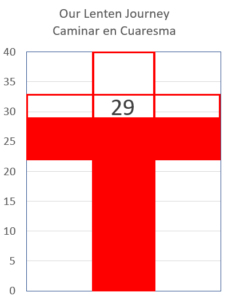

Our Lenten Journey / Caminar en Cuaresma
versión en español
Saturday – March 25 – Day 28
Public Sinners
“Let the one among you who is without sin be the first to throw a stone at her.” John 8:7
This is a powerful line spoken by Jesus. The judgmental and condemning Pharisees brought a woman to Jesus who had apparently been caught “in the very act of committing adultery.” Was she a sinner? Yes, indeed she was. But this story is not so much about whether or not she was a sinner. It was about the attitude Jesus had toward sinners as compared to that held by the self-righteous, judgmental and condemning Pharisees.
First of all, let’s look at this woman. She was humiliated. She had committed sin, was caught, and was publicly presented to all as a sinner. How did she react? She didn’t resist. She didn’t remain in denial. She didn’t get angry. She didn’t fight back. Instead, she stood there humiliated, awaiting her punishment with a sorrowful heart.
Humiliation over one’s sins is a powerful experience that has the potential to bring forth true repentance. When we encounter someone who has sinned in a manifest way and is humiliated over their sin, we must treat them with compassion. Why? Because the dignity of the person always supersedes their sin. Every person is made in the image and likeness of God, and every person deserves our compassion. If one is obstinate and refuses to see their sin (such as in the case of the Pharisees), then an act of holy rebuke is necessary to help them repent. But when one experiences sorrow and, in this case, the added experience of humiliation, then they are ready for compassion.
By stating “Let the one among you who is without sin be the first to throw a stone at her,” Jesus is not justifying her sin. Rather, He’s making it clear that no one holds the right of condemnation. No one. Not even the religious leaders. This is a hard teaching to live for many in our world today. It is commonplace for the headlines in the media to almost compulsively present us with the most sensational sins of others. We are constantly being tempted to be outraged at what this or that person has done. We easily shake our heads, condemn them and treat them as if they were dirt. In fact, it seems that many people today see it as their duty to act as the “watchdogs” against every sin they can dig up on others.
Reflect, today, upon whether you are more like the Pharisees or Jesus. Would you have stood there in the crowd wanting this humiliated woman to be stoned? How about today? When you hear about the manifest sins of others, do you find yourself condemning them? Or do you hope that mercy is shown to them? Seek to imitate the compassionate heart of our divine Lord; and when your time of judgment comes, you also will be shown an abundance of compassion.
Let us Pray:
My merciful Lord, You see past our sin and look to the heart. Your love is infinite and awe-inspiring. I thank You for the compassion You have shown to me, and I pray that I may always imitate that same compassion to every sinner all around me.
Source: mycatholic.life
USCCB Daily Readings: bible.usccb.org/bible/readings/032723.cfm
Lunes – 27 de marzo – Día 29
Pecadores públicos
“El que de vosotros esté libre de pecado, sea el primero en arrojarle la piedra”. Juan 8:7
Esta es una línea poderosa dicha por Jesús. Los fariseos que juzgaban y condenaban le llevaron a Jesús a una mujer que aparentemente había sido sorprendida “en el acto mismo de cometer adulterio”. ¿Era una pecadora? Sí, de hecho lo era. Pero esta historia no se trata tanto de si ella era pecadora o no. Se trataba de la actitud que Jesús tenía hacia los pecadores en comparación con la que tenían los fariseos santurrones, que juzgaban y condenaban.
En primer lugar, miremos a esta mujer. Fue humillada. Ella había cometido pecado, fue atrapada y presentada públicamente a todos como pecadora. ¿Cómo reaccionó ella? Ella no se resistió. Ella no permaneció en negación. Ella no se enojó. Ella no se defendió. En cambio, se quedó allí humillada, esperando su castigo con un corazón afligido.
La humillación por los pecados de uno es una experiencia poderosa que tiene el potencial de producir un verdadero arrepentimiento. Cuando nos encontramos con alguien que ha pecado de manera manifiesta y está humillado por su pecado, debemos tratarlo con compasión. ¿Por qué? Porque la dignidad de la persona siempre está por encima de su pecado. Cada persona está hecha a imagen y semejanza de Dios, y cada persona merece nuestra compasión. Si uno es obstinado y se niega a ver su pecado (como en el caso de los fariseos), entonces es necesario un acto de reprensión santa para ayudarlos a arrepentirse. Pero cuando uno experimenta dolor y, en este caso, la experiencia adicional de humillación, entonces está listo para la compasión.
Al decir: “El que de vosotros esté sin pecado sea el primero en arrojarle la piedra”, Jesús no está justificando su pecado. Más bien, está dejando en claro que nadie tiene el derecho de condenación. Nadie. Ni siquiera los líderes religiosos. Esta es una enseñanza difícil de vivir para muchos en nuestro mundo de hoy. Es un lugar común que los titulares de los medios de comunicación nos presenten casi compulsivamente los pecados más sensacionalistas de los demás. Estamos constantemente tentados a sentirnos ultrajados por lo que esta o aquella persona ha hecho. Fácilmente sacudimos la cabeza, los condenamos y los tratamos como si fueran basura. De hecho, parece que muchas personas hoy en día ven como su deber actuar como los “perros guardianes” contra cada pecado que puedan desenterrar en otros.
Reflexiona, hoy, sobre si eres más como los fariseos o como Jesús. ¿Te hubieras quedado allí entre la multitud queriendo que esta mujer humillada fuera apedreada? ¿Que tal hoy? Cuando escuchas acerca de los pecados manifiestos de otros, ¿te encuentras condenándolos? ¿O esperas que se les muestre misericordia? Buscad imitar el corazón compasivo de nuestro divino Señor; y cuando llegue vuestro tiempo de juicio, también se os mostrará una gran compasión.
Oremos:
Mi Señor misericordioso, Tú ves más allá de nuestro pecado y miras al corazón. Tu amor es infinito e imponente. Te agradezco la compasión que me has mostrado, y oro para poder siempre imitar esa misma compasión hacia todos los pecadores que me rodean.
Lecturas de Hoy: bible.usccb.org/es/bible/lecturas/032723.cfm